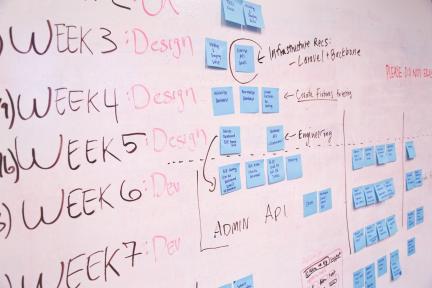Teaching Public Service in the Digital Age is a new initiative by an international community of professors, teachers and practitioners

Currently, they are also working on developing a masters-level full-semester modular syllabus that will be released as an open educational resource this autumn/fall.
On the European side, one of the main contributors and a member of the core editorial team of this new project is Professor Dr. Ines Mergel. Ines is a Full Professor of Public Administration in the Department of Politics and Public Administration at the University of Konstanz, Germany, and an elected Fellow of the National Academy of Public Administration (NAPA). Throughout her career she has been actively involved in research and teaching on the digital transformation of public administrations and currently studies which digital competencies are necessary to scale up these initiatives to digitally deliver public services.
Recently, we had the pleasure of attending the first public online presentation of the initiative and had a Q&A with Prof Mergel about this new project. So, Prof Mergel…
1. Which was the main motivation that led you (and the rest of the team) to launch the ‘Teaching Public Service in the Digital Age’ initiative? Which are the main challenges that the initiative is trying to solve?
This initiative was started by David Eaves, who is currently a lecturer at Harvard’s Kennedy School of Government together with Tom Steinberg who is a civic tech entrepreneur in the UK – some of us know him as the founder of MySociety. They then pulled together a group of us around the world who are either implementing digital transformation projects or who are delivery digital skills either in government digital academies or in higher educatio

The initial idea was to create open education resources for those of us who are teaching about the digital transformation of the public sector. It is a fast-moving field, with technology trends left and right and a civil service workforce that is mostly relying on external vendors and IT service providers to build software for them. What all of us – uniformly - have encountered is, that civil servants rarely have the ability to speak eye to eye with technologists, because of NPM modernization efforts: Most specialist expertise in the field of technology is outsourced and negotiations are left of the legal staff – contract specialist, but not technology specialists in government. We have therefore observed that technology is delivered over budget because of either missing or expensive changes in requirements over time or a lack of knowledge about the final product. We also observed that lots of public services might be delivered catering to the internal mindset of civil servants -or their interpretation of a policy, but that lots of those policies never specify what a final digital public service should look like. They miss steps like user-centric design or user research to understand what the final (internal or external) users actually need.
A policy problem then very fast becomes a technology problem – and is pushed to the IT department in the basement – but vanishes from those who have the policy or process skills to master it.
We also observed across the board – in most of the participating public affairs programs represented in our core team and those of our closest collaborators on the project – that e-government and technology management classes are either nice-to-have electives or that our students reach out to us as alumni and tell us they wish they had taken more of our classes, because every single project in government is now also a digital project.
One of our central themes is therefore to connect with people responsible for program design and show ways in which digital competencies can be included in the core curriculum of public affairs programs.
2. How could the initiative help address these challenges? Tell us a few words about it.
Given the apparent lack of digital in the core curriculum of public affairs programs and an immense reliance on outside expertise, we set out to design a corpus of digital competencies. Over the last year, we developed them in a truly iterative fashion. We are currently writing a narrative around them to highlight why they are important and will publish them in full by October 2020. Furthermore, we are designing a modular curriculum around them. That means that we create different options on how to teach them – one major challenge that every educator runs into.
We believe that it is important to also talk to deans and program directors at public affairs schools to understand what their needs are when designing modern public affairs programs. We also talk to accreditation institutes to understand how we can help to integrate digital competencies into the core curriculum.
By raising awareness – and here the pandemic has really accelerated things – we are aiming to distribute our resources, gain support for our ideas on how to teach digital topics as part of every public affairs program, and solicit input to further develop the open educational resources.
In parallel, we also collaborate with contributors around the world, so that we can challenge our viewpoints, test our own hypotheses how things have to be done, and expand the topics, use cases, and reading materials.
As soon as the syllabus is available online, we will also launch a series of support functions for faculty and other educators to connect, exchange ideas on how to teach, and generally support each other.
3. Which is the best way to educate senior civil servants about the need of digital skills in the public sector (i.e. educational awareness campaigns/mandatory training with internal or external educational providers/awards for civil servants that complete a certain amount of digital training hours)?
What we noticed is that any kind of e-government or digital competency seminars are

It would therefore be useful to move digital competencies into the core curriculum by adding modern project management skills, like agile or iteration, assessment techniques for the evaluation of user needs, or how to buy software, plan the requirements and finance large projects.
When these skills are not part of the core curriculum, we should be offering continuous education – these are not one-off skills. They are constantly evolving; new technologies are entering the stage and public servants need to be able to evaluate whether they are useful to solving policy problems. We need to avoid that civil servants are constantly chased by market forces in a technologically deterministic manner and feel the pressure to adhere to the newest technology fashion. Instead, we need to train them to be able to assess these trends and understand whether they support to solve policy problems.
4. We are aware that you and your team are currently working on a full semester, open access syllabus suitable for teaching master level students Digital Era Competencies. When will the syllabus be publicly available? How do you expect that the syllabus will benefit the existing university curriculum?
All of our open educational resources will gradually appear on our website and educators around the world can use the syllabus either in total or simply pick and choose modules from it to add to their own courses. We are offering ways for additional contributors to join us and expand the types of readings, practices, and cases for a variety of regions and languages around the world.
The beauty of this approach is, that we are writing out different options for each topic: either two full sections, one section, etc. with different pedagogical approaches (lectures, case discussions, hands-on exercises, video lectures, guest speakers, etc.) to address different needs that teachers might have for a diverse set of audiences.
Our goal is to create a community of educators who can support each other in continuously advancing the content – in parallel to the fast developments in technology. The project is therefore a truly living community that constantly updates itself.
5. In terms of synergies with the Interoperability (IOP) Academy, how could this initiative be beneficial to the IOP Academy?
My hope would be that many different initiatives can link up and share resources. We all have the same goal in mind to modernize public service, support civil servants in the important work they do every day for society and help them be adaptable to the changing challenges they face in these very complex times.
Our approach might be different than the IOP Academy’s approach that focuses on learning pathways for certain specialists. We are aiming to enhance the knowledge and skills on a generalist level for both digital-era leaders and civil servants. Without a core understanding of what digital is and how it provides opportunities, it will be difficult to fully adapt to the changing requirements. Public managers need to have a foundational understanding to lead teams of specialists, but also cross-functional teams with many different experts from different disciplines. They need to be able to address and negotiate digital issues with policy makers, implementers and also vendors and consultants, so that they know the “art of the possible”. Our goal is to train public managers who can detect trends, know when and how to invest in them, lead the necessary change and overcome barriers of traditional bureaucracies. In summary, I believe that TPSDA is adjacent to the IOP Academy and will help to bring the competencies necessary into public affairs programs.
6. How could the IOP Academy help you in achieving your initiative’s objectives?
We would love to collaborate closer with the IOP Academy to promote each other’s initiatives through talks, shared open educational resources, etc. The task of upskilling the civil service is so huge and will take decades.
7. What should we expect from ‘Teaching Public Service in the Digital Age’ initiative in the next few months?
We will publish our modular syllabus in October and will run a series of webinars in different languages (so far English, German and Spanish) to explain our ideas and how to use the content. In addition, three of us are test-teaching the syllabus right now in the US, Estonia and Germany. We will digest our lessons learned and frequently update the teaching notes and write blog posts and journal articles where we discover that content is missing.
In addition, we are writing a series of papers for different audiences to further distribute our ideas, look for additional support to keep the website running, and expand our conversations with decisions makers in governments and in public affairs schools.
8. Are there any additional remarks that you would like to share with us?
We hope that educators in Europe find this initiative useful. They can join us for online meetings, or simply read along and use the material we are developing as open educational resources!

